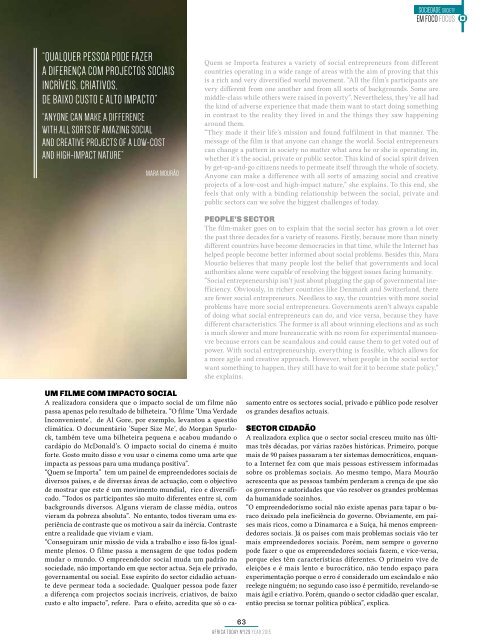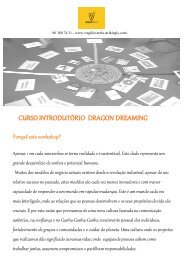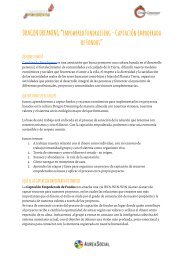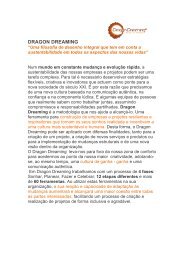Sociedade_Em Foco_Quemseimporta
Create successful ePaper yourself
Turn your PDF publications into a flip-book with our unique Google optimized e-Paper software.
sociedade society<br />
EM FOCO FOCUS<br />
“Qualquer pessoa pode fazer<br />
a diferença com projectos sociais<br />
incríveis, criativos,<br />
de baixo custo e alto impacto”<br />
“Anyone can make a difference<br />
with all sorts of amazing social<br />
and creative projects of a low-cost<br />
and high-impact nature”<br />
Mara Mourão<br />
Quem se Importa features a variety of social entrepreneurs from different<br />
countries operating in a wide range of areas with the aim of proving that this<br />
is a rich and very diversified world movement. “All the film’s participants are<br />
very different from one another and from all sorts of backgrounds. Some are<br />
middle-class while others were raised in poverty”. Nevertheless, they’ve all had<br />
the kind of adverse experience that made them want to start doing something<br />
in contrast to the reality they lived in and the things they saw happening<br />
around them.<br />
“They made it their life’s mission and found fulfilment in that manner. The<br />
message of the film is that anyone can change the world. Social entrepreneurs<br />
can change a pattern in society no matter what area he or she is operating in,<br />
whether it’s the social, private or public sector. This kind of social spirit driven<br />
by get-up-and-go citizens needs to permeate itself through the whole of society.<br />
Anyone can make a difference with all sorts of amazing social and creative<br />
projects of a low-cost and high-impact nature,” she explains. To this end, she<br />
feels that only with a binding relationship between the social, private and<br />
public sectors can we solve the biggest challenges of today.<br />
People’s sector<br />
The film-maker goes on to explain that the social sector has grown a lot over<br />
the past three decades for a variety of reasons. Firstly, because more than ninety<br />
different countries have become democracies in that time, while the Internet has<br />
helped people become better informed about social problems. Besides this, Mara<br />
Mourão believes that many people lost the belief that governments and local<br />
authorities alone were capable of resolving the biggest issues facing humanity.<br />
“Social entrepreneurship isn’t just about plugging the gap of governmental inefficiency.<br />
Obviously, in richer countries like Denmark and Switzerland, there<br />
are fewer social entrepreneurs. Needless to say, the countries with more social<br />
problems have more social entrepreneurs. Governments aren’t always capable<br />
of doing what social entrepreneurs can do, and vice versa, because they have<br />
different characteristics. The former is all about winning elections and as such<br />
is much slower and more bureaucratic with no room for experimental manoeuvre<br />
because errors can be scandalous and could cause them to get voted out of<br />
power. With social entrepreneurship, everything is feasible, which allows for<br />
a more agile and creative approach. However, when people in the social sector<br />
want something to happen, they still have to wait for it to become state policy,”<br />
she explains.<br />
Um filme com impacto social<br />
A realizadora considera que o impacto social de um filme não<br />
passa apenas pelo resultado de bilheteira. “O filme ‘Uma Verdade<br />
Inconveniente’, de Al Gore, por exemplo, levantou a questão<br />
climática. O documentário ‘Super Size Me’, do Morgan Spurlock,<br />
também teve uma bilheteira pequena e acabou mudando o<br />
cardápio do McDonald’s. O impacto social do cinema é muito<br />
forte. Gosto muito disso e vou usar o cinema como uma arte que<br />
impacta as pessoas para uma mudança positiva”.<br />
“Quem se Importa” tem um painel de empreendedores sociais de<br />
diversos países, e de diversas áreas de actuação, com o objectivo<br />
de mostrar que este é um movimento mundial, rico e diversificado.<br />
“Todos os participantes são muito diferentes entre si, com<br />
backgrounds diversos. Alguns vieram de classe média, outros<br />
vieram da pobreza absoluta”. No entanto, todos tiveram uma experiência<br />
de contraste que os motivou a sair da inércia. Contraste<br />
entre a realidade que viviam e viam.<br />
“Conseguiram unir missão de vida a trabalho e isso fá-los igualmente<br />
plenos. O filme passa a mensagem de que todos podem<br />
mudar o mundo. O empreendedor social muda um padrão na<br />
sociedade, não importando em que sector actua. Seja ele privado,<br />
governamental ou social. Esse espírito do sector cidadão actuante<br />
deve permear toda a sociedade. Qualquer pessoa pode fazer<br />
a diferença com projectos sociais incríveis, criativos, de baixo<br />
custo e alto impacto”, refere. Para o efeito, acredita que só o ca-<br />
samento entre os sectores social, privado e público pode resolver<br />
os grandes desafios actuais.<br />
Sector cidadão<br />
A realizadora explica que o sector social cresceu muito nas últimas<br />
três décadas, por várias razões históricas. Primeiro, porque<br />
mais de 90 países passaram a ter sistemas democráticos, enquanto<br />
a Internet fez com que mais pessoas estivessem informadas<br />
sobre os problemas sociais. Ao mesmo tempo, Mara Mourão<br />
acrescenta que as pessoas também perderam a crença de que são<br />
os governos e autoridades que vão resolver os grandes problemas<br />
da humanidade sozinhos.<br />
“O empreendedorismo social não existe apenas para tapar o buraco<br />
deixado pela ineficiência do governo. Obviamente, em países<br />
mais ricos, como a Dinamarca e a Suíça, há menos empreendedores<br />
sociais. Já os países com mais problemas sociais vão ter<br />
mais empreendedores sociais. Porém, nem sempre o governo<br />
pode fazer o que os empreendedores sociais fazem, e vice-versa,<br />
porque eles têm características diferentes. O primeiro vive de<br />
eleições e é mais lento e burocrático, não tendo espaço para<br />
experimentação porque o erro é considerado um escândalo e não<br />
reelege ninguém; no segundo caso isso é permitido, revelando-se<br />
mais ágil e criativo. Porém, quando o sector cidadão quer escalar,<br />
então precisa se tornar política pública”, explica.<br />
63<br />
Africa today nº129 YEAR 2015










